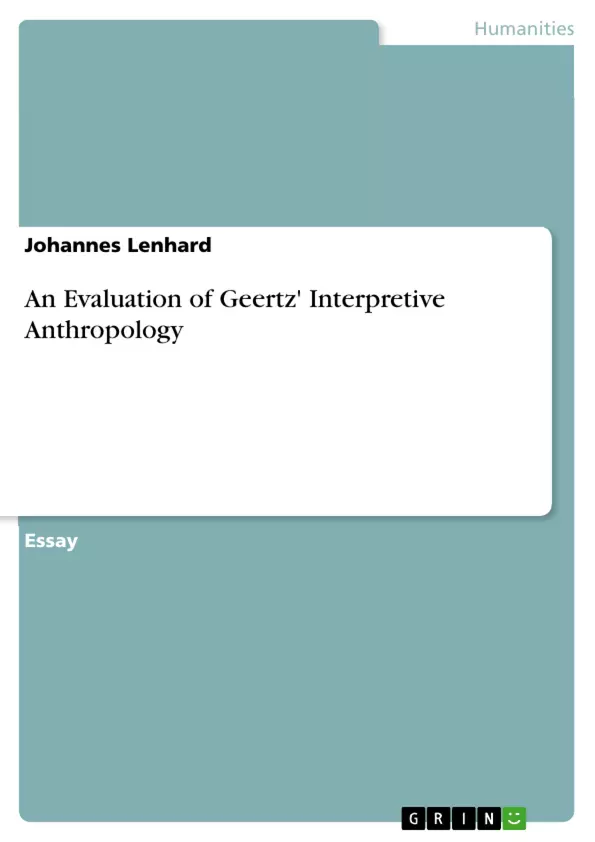As Geertz himself has recognised, “one cannot write a ‘General Theory of Cultural Interpretation’” (TD, 26). It might therefore be wrong right from the beginning to talk about his ‘project’. Accepting this notion for a moment, one has furthermore to acknowledge that Geertz has only picked up different traditions – namely those of Weber, Boas and Kluckhohn in the social sciences and Wittgenstein and Husserl in philosophy – and ‘melted’ them into a distinguishable whole (Ortner, 1984). If one also dismisses this historical analysis for a moment and takes Geertz project of an ‘interpretive anthropology’ as a given whole, a description develops around his notions of semiotic culture, thick description, small matters and native narratives.
It is in those ideas that one finds both Geertz’ strengths and weaknesses as I argue below. Arguing both in abstract, theoretical terms and in relation to Geertz’ major ethnographies – Negara, Meaning and order in Moroccan society and Deep play – the significance of the interpretive project is undeniable but not without limitations:
Does the interpretation of culture as a text make sense? How does Geertz link his focus on ‘small matters’ towards an analysis of culture? Is it possible to deny theory?
Table of Contents
- Introduction
- Social sciences, thick description and the semiotic concept of culture
- The interpretive project – Small matters and native narratives
- Geertz' project – strengths and limitations
- The project's achievements
- Shortcomings of Geertz' project
Objectives and Key Themes
This text analyzes and critiques Clifford Geertz's project for an interpretive anthropology. It examines his concepts, methods, and contributions to the field, highlighting both their strengths and limitations. The text also explores the broader implications of Geertz's approach for social science research, particularly in relation to the role of culture, symbols, and interpretation in understanding human behavior.
- Geertz's concept of thick description and its implications for cultural analysis
- The importance of small matters and native narratives in anthropological research
- The limitations of the interpretive project in terms of theoretical framing, historical context, and generalizability
- The contributions of Geertz's approach to the study of culture, particularly his focus on symbols and the actor's point of view
- The potential for misinterpretations and biases in Geertz's approach, particularly in relation to gender and power dynamics
Chapter Summaries
The first chapter of the text introduces Geertz's project for an interpretive anthropology and outlines its core concepts, including thick description, semiotic culture, small matters, and native narratives. The second chapter examines the strengths of Geertz's approach, highlighting its contributions to the study of culture, its emphasis on the actor's point of view, and its reintroduction of culture into anthropology. The third chapter addresses the limitations of the interpretive project, exploring critiques related to its theoretical framework, its neglect of historical context, and its potential for bias in the interpretation of cultural phenomena. The text concludes with a discussion of the broader implications of Geertz's work for social science research and the ongoing debate surrounding the role of interpretation in understanding human behavior.
Keywords
This text focuses on interpretive anthropology, thick description, semiotic culture, small matters, native narratives, Clifford Geertz, cultural analysis, social science, symbols, meaning, interpretation, ethnography, Bali, Morocco, Negara, suq, deep play, cockfight, limitations, achievements, critique.
Frequently Asked Questions
What is Clifford Geertz's concept of 'thick description'?
Thick description refers to the detailed account of field data that includes the context and the meanings assigned to social actions by the actors themselves.
How does Geertz define culture?
Geertz views culture as a semiotic system—a web of significance that humans have spun themselves and in which they are suspended.
What are the main strengths of interpretive anthropology?
Strengths include its focus on the actor's point of view, the importance of symbols, and the reintroduction of culture as a central theme in social science.
What are the limitations of Geertz's project?
Critiques often point to a lack of generalizable theory, the neglect of historical and political context, and potential biases regarding power and gender dynamics.
Why does Geertz focus on 'small matters'?
He believes that broad cultural interpretations must be grounded in the microscopic analysis of specific, everyday social interactions and "native narratives."
Can culture be interpreted like a text?
Geertz argues that social action can be read as a text to uncover the underlying meanings and symbols that guide a society's behavior.
- Arbeit zitieren
- Johannes Lenhard (Autor:in), 2013, An Evaluation of Geertz' Interpretive Anthropology, München, GRIN Verlag, https://www.hausarbeiten.de/document/209434


